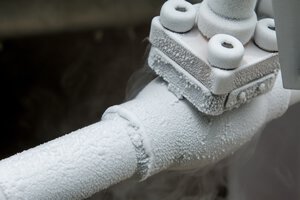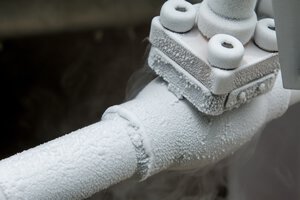
How to Prevent Your Pipes From Freezing

When the temperature drops the pipes in our homes become vulnerable to freezing, which ultimately prevents water flow throughout the home. That alone is a concern, but the larger issue happens when a frozen pipe bursts. Keep in mind, a 1/8-inch crack in a pipe can release up to 250 gallons of water a day, causing serious damage to your home.
Many people mistakenly believe frozen pipes only occur in climates with extremely cold temperatures. While regions like that do have an increased risk, frozen pipes can happen here in Central Pennsylvania. Here’s why.
Pipes freeze due to a combination of factors:
- A quick drop in temperature
- An extended period of extreme cold temperatures
- Poor insulation around your pipes
- The thermostat may be set too low
You can’t prevent the temperature from dropping, but there are steps you can take now to reduce the likelihood of an in-home disaster this winter.
- Disconnect outside garden hoses.
- Beware of wind. Sustained wind can be the biggest problem as it penetrates through the insulation and exposes cracks.
- Inspect areas near your pipes and caulk any holes or cracks. This will keep cold air from entering your home.
- Check the insulation around the pipes in areas of your home that tend to get colder than others. This includes your attic, basement, crawl spaces and even your garage. If the insulation is lacking, add to it.
- Open the doors under the kitchen sink and vanities to allow room temperature heat to warm the pipes. This is especially helpful at night when the water is not being used.
- Wrap easily accessible pipes with approved heat tape, carefully following the provided safety warnings.
- Allow your faucet to drip, just slightly. This trick helps to alleviate pressure should pipes freeze, and help prevent an actual pipe burst.
Tips if you travel:
If you’re among the many snowbirds who head south for the winter, you need to take special precautions to ensure your home is safe while you’re away.
- Shut off the main water supply and drain your pipes by opening faucets and flushing toilets.
- Buy a sensor online that will call you if the temperature in a room goes below 45 – 50 degrees. Some alarm companies also have this type of warning system.
- Keep your heat at 68 degrees to provide enough heat to keep the pipes in your home warm, which helps to prevent any water left in your pipes from freezing.
- Have a neighbor check your home at least twice a week. A house can freeze up in a couple of days when the temperature stays in the teens.
If your pipes do freeze, make sure your faucets remain open as you apply heat to the frozen area using a safe device such as a heating pad or hair dryer. If this does not remedy the situation or if you can’t find the frozen area, just call Ranck.